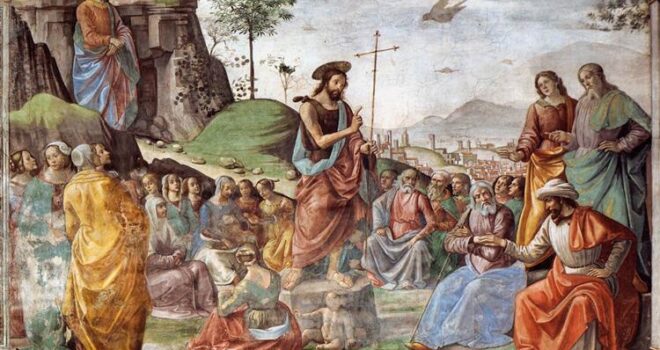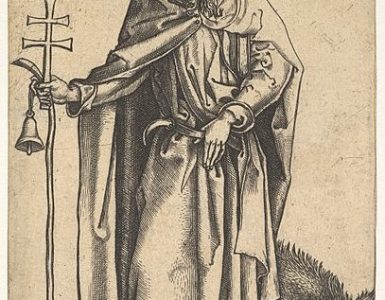A Reflection for the Solemnity of the Nativity of St. John the Baptist
(Read Is 49:1-6; Ps 139:1-3, 13-15; 1 Pt 1:8-12; Lk 1:5-17)
Concerning this salvation…it was revealed to [the prophets] that they were serving not themselves but you with regard to the things that have now been announced to you.
Regardless of one’s personal views on the subject of climate change, no doubt the reason it is such a highly discussed topic is ultimately due to the innate human instinct for survival. But what is so fascinating about our sense of urgency to preserve our planet is that, unlike the instinct we would experience to hang onto a life preserver after a shipwreck, or even the instinct we would experience in defending our children from a would-be attacker, the instinct to save the planet is one that is neither for our own personal preservation, nor is it for the preservation of anyone we know at the present time. To work to preserve and care for our planet is primarily for the benefit of those who are to come long after we’re gone. It is a preservation for a people about whom we can only imagine.
And so it is for the prophets. Prophets are the ones chosen by God for the purpose of preserving the life of others. What’s more, those “others” are often people they will never encounter in this life because they are people who are to come after them. John the Baptist could have spent his days quietly with his beloved parents, caring for them faithfully and dutifully in their old age, and he would have been considered a holy and righteous man. He would have been a good example to his neighbors, perhaps even inspiring a few of his peers to act in kind towards their own parents. That humble, quiet example is what most of us are called to most of the time, but not so with the great prophets.
Though I thought I had toiled in vain, and for nothing, uselessly, spent my strength, yet…now the LORD has spoken who formed me as his servant from the womb, that Jacob may be brought back to him and Israel gathered to him…
And so we learn from the great prophets that when God calls us to be “little” prophets in imitation of them, we should not expect to see immediate results. In fact, we may not see any results in our lifetime because the message that the Lord has for us to proclaim in the capacity of prophet is one that interprets what is happening now, meant not just for us, but also for future generations. It’s the reason St. Therese’s Story of a Soul was virtually unknown until after her funeral, and the reason St. Faustina’s Diary didn’t make it into bookstores until decades after her death. Their words were meant to instruct and preserve the faith of the ones to come after them.
But that brings us to the obvious question: why does the Lord not allow a prophet the satisfaction of a little success, just to keep him encouraged and persevering in an otherwise thankless job? It would seem one reason is that “success” has a way of tainting the work the Lord has for us to do. If Therese’s “little way” had been revealed to the world while she was still alive, perhaps she would have been asked to do some local speaking engagements. Perhaps those local engagements would have turned into national, and international, ones. Perhaps book signings would have been scheduled, contracts for new books signed, and the proceeds put towards supporting her order—a financial aid that would no doubt have been put to good use. But then suddenly, Therese’s “way” wouldn’t have seemed so “little” anymore. An average soul would have had a hard time drawing inspiration from one who had no idea what it’s like to be unnoticed and unappreciated. To her, St. Therese wouldn’t really have seemed like much of a “prophet.”
[John] will turn many of the children of Israel to the Lord their God…to turn their hearts toward their children…to prepare a people fit for the Lord.
And now let us turn to our role, not only as “little prophets” speaking God’s message for future generations, but also as recipients of God’s message to us now from the great prophets who came before us. Of course, the prophecy we receive is meant to stir our hearts to change, to lead us to grow in holiness, to inspire us to love God and neighbor more. John’s prophecy was indeed meant to “turn the hearts of…the disobedient to the understanding of the righteous.” However, there was a second purpose to John’s prophecy—in fact, to all prophecy—and it is this purpose we must not overlook:
He will go before him in the spirit and power of Elijah to turn their hearts toward THEIR children…
The central purpose of any prophecy we receive is to convert our own hearts, that we might then seek to form the hearts of those who come after us. We cannot keep our conversion to ourselves, for our own personal gain. Thus, our role as prophet and recipient of prophecy is one and the same! We must seek unceasingly to preserve the faith for future generations.
Well, that’s a huge responsibility! What’s a little soul to do in a world so hostile to Christian teaching? How do we preserve a faith when it seems the collective view of secular society is taking over, leading the children of our generation to accept false teachings?
For whoever wishes to save his life will lose it, but whoever loses his life for my sake will find it. (Mt 16:25)
We must love. Not the kind of love that is a “feel good” love which tolerates sin and relativism; Chistian love is a love that is willing to give up one’s life for others. We’re not willing to kill that we might save ourselves; we’re willing to die so that others might live. There is no force more powerful than the love of a martyr.
No one has greater love than this, to lay down one’s life for one’s friends. (Jn 15:13)
Of course, the way most of us are called to “die” for Christ is not necessarily by way of martyrdom, as was John the Baptist’s call, but rather, by way of “dying to self”—that is, by accepting our own trials each day with as much love as we can muster. Just like John the Baptist, our love will change the hearts of this world for future generations. And the beauty of this kind of sacrificial love is that as we accept all those little pinpricks more and more, Jesus prepares us for what He has planned for us. Because as we submit to His will in little ways, we learn to trust Him in big ways until finally, one day, we are unshakably peaceful and truly unafraid. The only room left in our hearts is for love.
And it is love that will preserve the faith for future generations.
Ghirlandaio, D. (c. 1490). Preaching of St. John the Baptist. [painting]. Retrieved from WikiArt.










